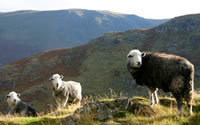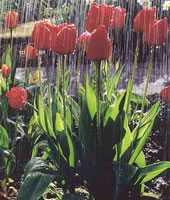Here’s a recording in a mystery language.
Can you identify the language, and do you know where it’s spoken?
Here’s a recording in a mystery language.
Can you identify the language, and do you know where it’s spoken?

This is a little ditty I came up with recently and which incorporates the old sheep scoring numbers and a bit about their history. I first discovered these numbers in a book about Cumbrian dialect in Lancaster library one day many years ago while I was waiting for my train home from school. The numbers I use here come from Keswick in Cumbria. There are many other versions from all over England, Wales and Scotland.
A long time ago in a land not so far away
The shepherds did count their sheep in this way
And the children did use these numbers in their play
And this is what they’d say.
Yan, tyan, tethera, methera, pimp
sethera, lethera, hovera, dovera, dick
yanadick, tanadick, tetherdick,
petheradick, bumfit, yanabumfit, tanabumfit,
tetherabumfit, petherabumfit, jiggit.
And when you get to jiggit put a stone in your pocket
a stone in your pocket
a stone in your pocket
When you get to jiggit put a stone in your pocket
a stone in your pocket
So you know how many jiggits you’ve got.
The last remaining fragments of long-forgotten Celtic tongues
That’s what they’re thought to be.
Collected mainly during the 19th century
In many parts of the north country.
And they go …
Yan, tyan, tethera, methera, pimp
sethera, lethera, hovera, dovera, dick
yanadick, tanadick, tetherdick,
petheradick, bumfit, yanabumfit, tanabumfit,
tetherabumfit, petherabumfit, jiggit.
And when you get to jiggit put a stone in your pocket
a stone in your pocket
a stone in your pocket
When you get to jiggit put a stone in your pocket
a stone in your pocket
So you know how many jiggits you’ve got.
Here’s a recording:
I sang this in public for the first time last night at Poetica, an evening of poetry and music at the Blue Sky Café in Bangor, and it went down well.
According to a study published in Psychological Science, the language you think and make decisions in can influence the decisions you make. The study found that people tend to be more willing to take risks if they are presented with choices in a foreign language than they are in their native language.
The researchers think that the use of a foreign language “provides greater cognitive and emotional distance than a native tongue does”. This is because one’s native language and emotions are inextricably linked, which can lead one to make illogical decisions, while foreign languages don’t usually have such strong emotional connections, so thoughts and decisions tend to be more rational and less influenced by emotions.
There are also articles about this study in the University of Chicago News and the Huff Post.
I’ve noticed that some expressions, such as terms of endearment and curses, tend to carry less emotional charge for me in languages other than English. I know such words in various languages, but they don’t seem as serious or meaningful to me as the English versions. Do you find this?
I came across the term flam paradiddle on the radio the other day and thought at first it might be used to describe some kind of movement – maybe a dance move or a skateboarding trick. Now I know that a flam paradiddle one of the patterns or rudiments used in drumming, or rather a combination of those rudiments.
A diddle is “a double stroke played at the current prevailing speed of the piece.”
A paradiddle “consists of two single strokes followed by a double stroke – i.e. RLRR or LRLL”
A flam “consists of two single strokes played by alternating hands (RL or LR). The first stroke is a quieter grace note followed by a louder primary stroke on the opposite hand. The two notes are played almost simultaneously, and are intended to sound like a single, broader note.”
A flam paradiddle is “a paradiddle with a flam on the first note. Also known as a flamadiddle.”
Source: Wikipedia
Another interesting term used in drumming is a pataflafla, which is “a four-note pattern with flams on the first and last notes.”
The etymology of these words is obscure.
So if any of my friends who are into drumming start talking about flam paradiddles or similar, I now have an idea of what they mean.
Here’s a recording in a mystery language.
Can you identify the language, and do you know where it’s spoken?
Last night I learnt a song, En el pozo María Luisa (In the Maria Lusia mine), from a Spanish friend. This song, which is also known as Nel Pozu Maria Luisa or Santa Bárbara Bendita, comes from Asturias in north west Spain and is usually sung in Asturian, Spanish or a mixture of the two. It is the story of a mining accident in the Pozu Maria Luisa coal mine, in the town of Ciaño in the municipality of Langreo.
While I was able to understand most of the words after hearing them a few times, some of them puzzled me. For example, when I heard the word pozo (mine) it sounded to me more like porzo, which I couldn’t find in my Spanish dictionaries when I looked. Eventually I found pozo when looking in the English-Spanish section for the word mine. Another word for mine is mina.
Pozo /’poθo/ is a well; a deep pool, the deep part of a river; a shaft, pit or mine; or the hold (of a ship). It comes from the Latin word puteus (pit, dungeon, well, cistern).
Expressions containing pozo include:
– pozo artesiano = artesian well
– pozo de petróleo = oil well
– pozo ciego/negro = cesspool
– caer en el pozo = to fall into oblivion
– pozo de aire = air shaft
– pozo de registro/visita = manhole / inspection hatch
– ser un pozo de ciencia = to be immensely learned
– es un pozo de maldad = he is utterly wicked
I assumed that the song was in Spanish, and that the words that puzzled me they were just ones I hadn’t heard before, like pozo. Now I realise that some of the words might have been Asturian – the Spanish friend who taught me the song is from Asturias.
According to an article I found today, the Russian Ministry of Education and Science plans to ‘clean up’ Russian by removing foreign loanwords and replacing them with native words. They plan to revise dictionaries, school textbooks, and to set up a website to explain the changes. The website will give Russian speakers a chance to check Russian usage with experts. Examples of foreign words give in the article are policymakeri and trendsetteri
This is the kind of thing that organisations like L’Académie française have been trying to do for years, without much success. While the new words might be adopted in formal usage, the chances of this happening in everyday speech and writing don’t seem very high. People tend to stick with the words they’re used to, unless new words become trendy.
Have there been efforts to ‘clean up’ other languages that you know of and that have succeeded?
The other day I came across an article about the Kumzari language and people. It reports that:
Iran’s threat of closing Straits of Hormuz, advent of TV, Internet to tiny village located on northernmost tip of Oman’s Musandam peninsula threaten survival of thousand year-old Kumzari language.
It describes Kumzari as:
the ancient Kumzari language, a mix of Indo-European languages and Arabic, remarkable in that it is the only non-Semitic language spoken on the Arabian peninsula in the past 1,400 years.
I thought it would be interesting to find out a bit more about this ‘ancient’ language – the use of the terms like ‘ancient’ and ‘thousand-year-old’ when talking about a language are common in reports of this nature. In linguistic terms it is fairly meaningless to give a language a specific age as languages don’t have specific start dates. Instead they are constantly changing and evolving and it’s very difficult to say when a particular language came into existence. What you can say is when a language was first written down, or at least when evidence of writing first appeared.
According to Wikipedia, Kumzari (کمزاری) is a Western Iranian language spoken by about 10,000 people in northern Oman. It is closely related to the Minabi dialect of southern Balochstan and is thought to be mutually intelligible with Luri, which is spoken in parts of Iran. So there are some other people out there who can potentially understand Kumzari, even though the artile claims that, “no one else on earth understands” it.
It is the only Iranian language spoken in the Arabian Peninsula and most of its vocabulary is Iranian, with also a lot of Arabic loanwords – so it’s possible to see how it might be described as ‘a mix of Indo-European languages and Arabic’.
I find that when reading articles like this it’s best to check their statements and claims, and not to take them at face value. The information on Wikipedia isn’t always completely reliable either, but sometimes it’s the only source. Inspite of this, it’s always interesting to find out about a language that I didn’t know about. If I can find more information, I’ll put together a page about it.
[Addendum] There is now a page about Kumzari on Omniglot.
Here’s a recording in a mystery language.
Can you identify the language, and do you know where it’s spoken?

The other day I discovered that the French equivalent of April Showers is Les giboulées de mars, or ‘March showers’. April showers sound soft and light to me, whereas Les giboulées de mars sound unpleasantly wet.
April showers are showers, often heavy, that fall in Spring, especially in March and April, in the northern hemisphere, particularly in the UK and Ireland, and also in France. They occur when the jet stream starts to move north in early spring letting strong winds and rain, and sometimes sleet and snow, sweep in from the Atlantic [source].
The word giboulée /ʒi.bu.le/ means sudden, short shower often mixed with snow or sleet, or in French ‘Pluie soudaine et brève souvent mêlée de neige ou de grésil.‘ [source]. It’s etymology is uncertain and is possibly related to the Langue d’Oc words giboulado (shower), gibourna (to sizzle) and/or gibournado (shower) [source]. Another French word for shower is averse.